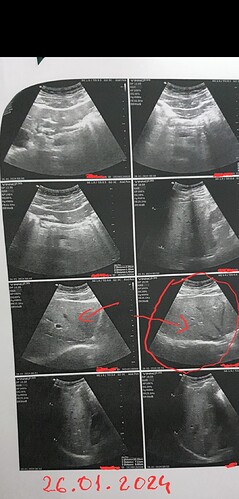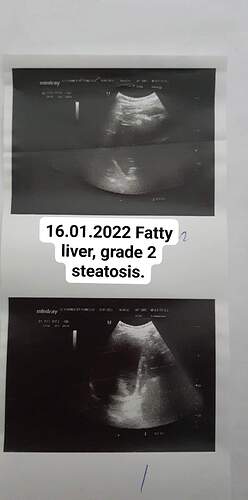Dear friends, I have come with good news! 7 years ago I found out that I had an inhomogeneous liver, grade 2 steatosis, but I didn’t care about this problem, but 3 years ago I found out that I have hepatitis B (with very low viremia: 64, <10, 11 and Aghbs 212) so I think it’s time to solve hepatic steatosis in these 3 years I had a diet: 70% vegetables, 20% quality proteins (chickpeas, lentils, beans, fish, beans) Complex carbohydrates: oatmeal, rye, quinoa, flax seeds. Natural fats: omega 3, walnuts, olive oil, pumpkin seeds, hazelnuts. 10% Dairy products with 1% fat. I combined a healthy diet with intermittent fasting 8/16, in the 8 hours I had only 2 meals. Hydration only plain water, 8 hours of sleep at night. No food sugar, sweets, saturated fat Walking every day 2500 steps (2 km) 3 years ago my body weight was 110 kg and now I am 80 but I need to lose up to 75 kg (I am 177 height cm) Unfortunately, I don’t like to do sports, so I lost more weight from a low-calorie diet. On 26.01.2024, I did an abdominal ultrasound (to present it to the doctor when I go for a medical check-up on 09.02.2024, plus tests for hepatitis B, in my case that I have low viremia, a medical check-up is done at 12 months according to the protocols established by the Romanian Ministry of Health), on this occasion I found out that I have a homogeneous liver, the joy was immense, I did not think that I would be able to get rid of fatty liver. I’ve come to the conclusion that healthy eating combined with exercise does wonders for the liver.
Well done! Keep up the good work and I’m sure you’ll get to the kilos that you want.
You have done an amazing job.
@MARIAN
Watch your iron levels. I actually became sick with low iron and have been put on iron tablets. I have no idea if it relates to my diet or something else.
My doctor and I will be exploring further.
Great to hear about your progress @MARIAN. It’s great that you are getting more towards the goals you’ve planned with your doctor. Please don’t forget that fatty liver usually has developed over many years and so may just need time with your consistent changes to reverse.
Thomas
Congratulations for your success.
MASLD is the dangerous silent killer of human in the world . The serious problem in short term is due to the cardio metabolic effects eg: DM , HT , ASCVD . If you can lose your weight at least 10% with lifestyle modifications, healthy diet and exercise ( aerobic/ resistance training) even though you may have genetic predisposed, the fatty liver will be solved completely. The treatment is easy but the patients must have discipline and awareness about the disease and screening early when they have abnormal in BMI/ waist circumference height ratio or sign of metabolic syndrome. The long term effects of MASLD if disease progression are cirrhosis and HCC and extrahepatic cancer which can be developed many years after diagnosed.
Thats really great and promising. I have a fatty liver as well and my doctor said woth doet and exercise, it could be reversed. Do youvhave recommendations on meal plans or recipes that you followed?
Thanks in advance
How is fatty liver treated? There are no alcoholic or non-alcoholic fatty liver medications. The only recommended therapeutic solution is lifestyle change, which includes: weight loss; adopting a healthy diet; physical activities performed regularly.
There is a recipe thread and would be happy for more people to add to it: Food, Activity, and habits alternatives guid
Additionally, some of the discussions in this other thread may help:
Lifestyle changes, nutrition, and supplements for hep b
Cheers,
Thomas
Hi @MARIAN,
Correct, though having just come from the big international liver disease conference, many people are working on this problem and potential ways to solve it through therapeutic means.
Thomas
Hi @MARIAN,
Thanks for sharing the Clinical trials article. I just wanted to point out that this paper focuses more on Fibrosis and then NAFLD (Non-Alcohol Fatty Liver Disease). Looking at the results, there was no reduction of fat in the liver but no worsening of the fat in approximately 1/4 of the drug groups.
So about your previous post, this medication supposedly helps by not aggravating NAFLD. However, this is only seen in a quarter of the test drug group so I am not sure if I would call this drug effective.
I should also note that the new term for NAFLD is now Metabolic dysfunction–associated steatotic liver disease (MASLD).
Reference: Fouad Y. (2023). Metabolic-associated fatty liver disease: New nomenclature and approach with hot debate. World journal of hepatology , 15 (2), 123–128. https://doi.org/10.4254/wjh.v15.i2.123
Moreover, have a read of the posts Thomas replied for you with:
and as always, have a chat with your health provider for more advice.
All the best,
Sumaya

